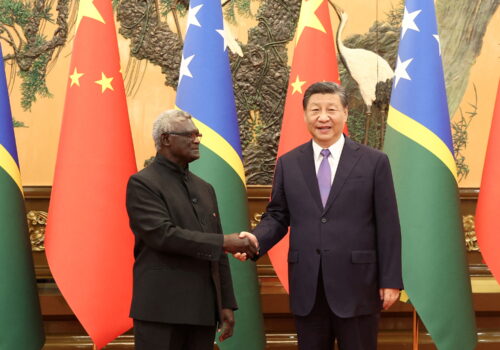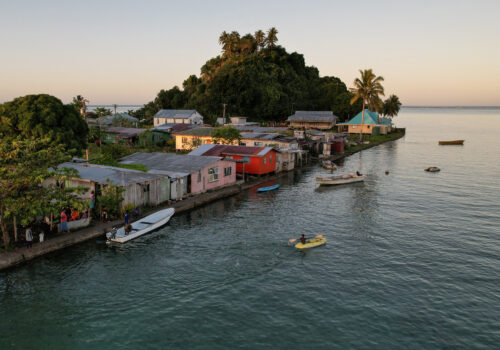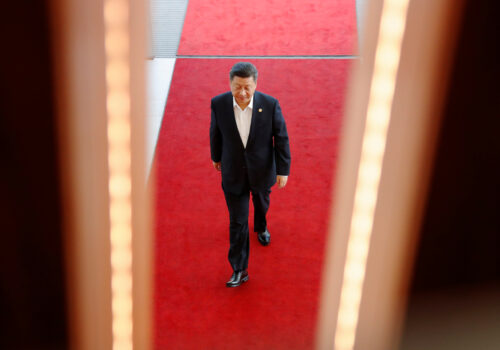What to expect from the Solomon Islands’ new prime minister on China, the West, and more
Following a hotly contested general election on April 17 and two weeks of coalition negotiations, Jeremiah Manele has emerged as the new prime minister of the Solomon Islands under the banner of the Government for National Unity and Transformation (GNUT). He defeated Matthew Wale, the candidate put forward by the Coalition for Accountability, Reform, and Empowerment (CARE) and two other political parties, by a vote of thirty-one to eighteen.
Incumbent Prime Minister Manasseh Sogavare, who led the Ownership, Unity, and Responsibility Party (OUR) into the election, opted on April 30 not to seek another term in the country’s highest office. While Sogavare retained his seat in parliament, his party’s relatively poor performance in the election was seen as a rebuke of his record on key domestic issues, including addressing poverty and unemployment and improving healthcare and infrastructure.
Manele, who served as Sogavare’s foreign minister for five years and brings deep diplomatic experience to the top job, has signaled a continuation of the country’s pro-China “Look North” policy. This will be welcomed by Beijing, which embraced the Solomon Islands after it withdrew diplomatic recognition of Taiwan in favor of relations with China in 2019—and especially after striking security and policing agreements with Honiara in 2022 and 2023, respectively.
However, in contrast to the oft gruff and polarizing Sogavare, the more amiable Manele may seek to lower the rhetorical temperature and foster more constructive relations with Western countries—a dynamic Canberra and Washington should watch closely. In an interview with ABC Australia, he stated his intent to “treat every and all of our partners as equals” and, in referencing the importance of his country’s partnership with China, that “Australia, our closest neighbor, is equally important.”
Thus, while Manele seems poised to continue the foreign policy course charted under Sogavare’s government, he will likely do so in his own way. A question remains, though: What role will Sogavare play moving forward? The wily political survivor remains as a member of parliament and Manele will need to account for the four-time prime minister’s views and preferences. Sogavare’s decision to bow out of the race on Tuesday may have been welcomed in Western capitals, but it is unlikely to be the last word from the Solomon Islands’ “master of mayhem.”
Parker Novak is a nonresident fellow with the Atlantic Council’s Global China Hub and Indo-Pacific Security Initiative, where he specializes in Southeast Asia, the Pacific Islands, Indo-Pacific geopolitics, and US foreign policy.
Further reading
Fri, Apr 12, 2024
As Sogavare seeks reelection in the Solomon Islands, China’s influence is on the ballot
New Atlanticist By Parker Novak
The April 17 elections in the Solomon Islands will determine whether the country doubles down on its ties with China or changes course.
Fri, Mar 29, 2024
Bolstering cooperation among Quad and Pacific Island countries
Issue Brief By Parker Novak, Kyoko Imai
As the Pacific Islands’ relevance grows, there’s an influx of diplomatic attention and development assistance as external powers seek to curry favor with the sixteen countries. Australia, India, Japan, and the United States (the Quad) seeks to bolster regional engagement to address key regional issues including climate, connectivity, economic development, and maritime security.
Wed, Apr 3, 2024
In the Pacific Islands, US delay is an invitation for China to step in
New Atlanticist By William Piekos
China’s recent efforts to lure Pacific Island governments into alignment with Beijing’s policy preferences heighten the importance of a consistent US focus on the region.
Image: Chinese State Councilor and Foreign Minister Wang Yi shakes hands with Solomon Islands Foreign Minister Jeremiah Manele during a ceremony to mark the establishment of diplomatic ties between the two nations at the Diaoyutai State Guesthouse in Beijing, China, September 21, 2019. Naohiko Hatta/Pool via REUTERS/File Photo


